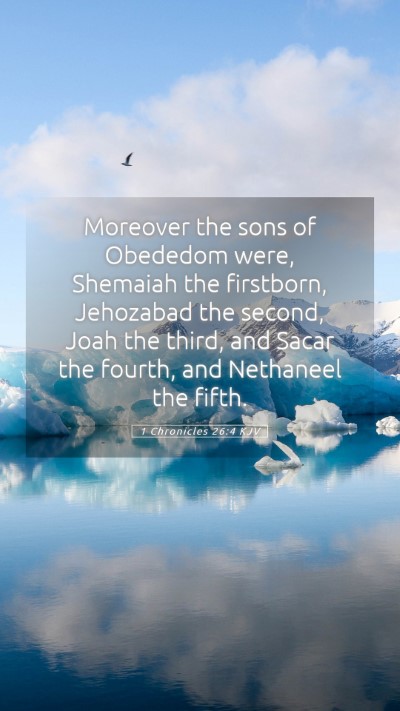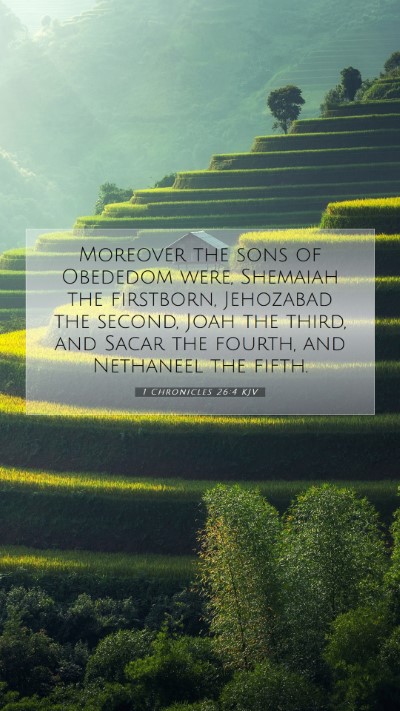Understanding 1 Chronicles 26:4 - Biblical Commentary and Insights
This passage, "And Obed-edom had sons; Shemaiah the firstborn, Jozabad the second, Joah the third, and Sacar the fourth, and Nethanel the fifth," provides insight into the lineage and important role of Obed-edom in the service of the Lord.
Here, we will explore the meaning of this Bible verse, delving into the historical context and Bible verse interpretations provided by renowned public domain commentaries.
Context of 1 Chronicles 26
To fully grasp the implications of 1 Chronicles 26:4, we must consider its place within the larger narrative of the book. Chronicles focuses on the history of Israel from Adam to the post-exilic period, emphasizing the temple's organization, worship practices, and the priestly duties which are central to the covenant community.
Key Themes in 1 Chronicles 26:4
- Inheritance of Responsibilities: Obed-edom’s sons are mentioned as part of a significant family responsible for temple duties.
- Divine Favor: Obed-edom was blessed following the ark of the covenant's stay at his house, indicating God's favor.
- Importance of Family Lineage: The verse highlights the biblical significance of family lineage in spiritual leadership.
Biblical Exegesis of 1 Chronicles 26:4
Matthew Henry, renowned for his comprehensive commentaries, emphasizes that the listing of Obed-edom’s sons indicates not only their lineage but also their roles in the service of the temple. This practice reflects the idea that spiritual responsibility and legacy are often shared among family members, enhancing the sanctity of their service.
Albert Barnes points out that Obed-edom, a former Gittite, became a significant figure in the worship system of Israel. His transition from being merely a keeper of the ark to a role that included raising sons who would potentially serve in temple duties indicates a transformative experience where God favors those who honor Him.
Adam Clarke elaborates on the importance of these names, highlighting that such genealogies demonstrate God’s providential care in establishing worship in Israel. These sons are not just names; they represent future generations dedicated to the service of the Lord.
Application of 1 Chronicles 26:4 to Daily Life
When considering the application of this Bible verse, we can draw parallels between the spiritual responsibilities of the descendants of Obed-edom and our own commitments to service within the church community.
Family plays a crucial role in cultivating a spirit of service and dedication to God, a theme prevalent throughout Scripture.
Individuals in modern-day Bible study groups might reflect on how their family histories impact their faith journeys, learning from the legacy of those who came before them. Online Bible study resources can be valuable in exploring similar genealogies and their meanings, helping deepen understanding.
Cross References
- 2 Samuel 6:10-12: Obed-edom’s initial blessings from housing the ark.
- 1 Chronicles 15:17-24: The roles assigned to the Levites concerning the ark.
- 1 Chronicles 16:38: The roles of priests and Levites in worship.
Conclusion
1 Chronicles 26:4 exemplifies the significance of family in the framework of biblical service and offers a poignant reminder that we carry a legacy that can influence future generations. Whether through family, church, or community services, the themes of responsibility, service, and divine favor resonate through the ages.
Understanding these Bible verse meanings is essential for applying them to our lives, further enhancing our Bible study insights and organizational worship.


